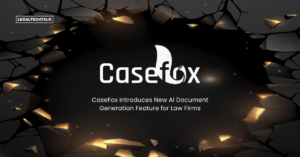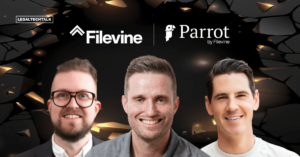In this interview, we sit down with Stuart Whittle to delve into the world of legal innovation. Stuart, a seasoned expert in the field, shares insights into the burgeoning developments in the legal industry, particularly the integration of generative AI and large language models like ChatGPT-4.
We explore how these innovations are poised to reshape the legal landscape and address industry challenges. Additionally, Stuart discusses the persistent barriers to innovation and the evolving complexities posed by the ever-changing technological landscape. Finally, he offers valuable advice for legaltech startups seeking collaborations with law firms, emphasising the importance of tailored solutions and thoughtful research. Join us as we navigate the evolving intersection of law and technology with Stuart Whittle.
Bradley Collins: Hi Stuart, thanks for your time. Given your areas of expertise, what are the most exciting innovation developments you see in the legal world and what problems are they helping the industry to overcome?
Stuart Whittle: Certainly the most talked about innovation development in the legal world is the integration of generative AI and in particular large language models. Every solution and its dog is racing to be able to say their solution is making use of LLMs and GPT4 in particular. The question you pose as to what problems LLMs are helping the legal industry overcome is a good one. LLM is helping the legal industry overcome. I have to admit, I am not really sure yet but time will tell.
Bradley Collins: What have been the biggest barriers to innovation and are you seeing any change in recent times? If so, what, why, and how…
Stuart Whittle: One of the biggest barriers, certainly in the legal industry, is time. Innovation takes time and, trite though it is to acknowledge, time is one of many things of which our organisations and indeed our clients’ organisations don’t carry a surplus. And that makes adoption, which is always a challenge even for people who have time, harder.
Whenever you are asking people to change you are asking them to do two things, both of which slow them down initially namely unlearn something they have done (for years in some cases) and learn a new way of doing something. It doesn’t matter how good your solution or innovation is, initially, it is going to slow people down. And these are people who don’t really have any slack to give. In terms of how this is changing – I am worried that it is in fact getting harder rather than easier.
If you then layer over that the near-constant technological development and change that is currently happening – a pace that I and all of my peers (and we are the people who are supposedly into technology) are really struggling to keep up with or know what to do with – it’s almost paralysing. We are starting things using one capability only to discover in 3 months’ time that all of that work is obsolete because the solution now has built-in what we trying to build in the first place. I exaggerate for effect, but not quite.
Bradley Collins: Finally – do you have any advice for legaltech startups out there that are looking to collaborate with law firms?
Stuart Whittle: I have a whole presentation that I do that is entitled, “The Good, The Bad, and The Ugly” based on 20 years of experience engaging with suppliers, start-ups included. I think the first thing you have to realise, and I am in no way being precious about it, but I and everyone in my position is bombarded with emails, telephone calls, and LinkedIn messages so I understand that getting attention can be hard and hugely frustrating. One of the key things I think, and I appreciate this is effortful, is to do your research on the organisation and the person you would like to talk to so you understand what the challenges they specifically are facing and therefore how your solution might address those challenges.
Key Takeaways:
1: Embrace Generative AI Explore the integration of generative AI, such as large language models like GPT-4, as it’s a significant innovation in the legal world. While the specific problems it addresses may evolve, understanding and adopting this technology is essential for staying competitive.
2: Recognise Time Constraints Acknowledge that time is a precious resource in the legal industry. When implementing innovations, anticipate that they might initially slow down processes as people need to unlearn old habits and adapt to new ones. Be patient and consider how your solution can minimize disruptions.
3: Research and Personalisation For legal tech startups seeking collaborations, thoroughly research the law firms and professionals you want to approach. Understand their specific challenges and tailor your solution to address those challenges. Personalised and well-informed communication is key to getting attention and building successful partnerships.








